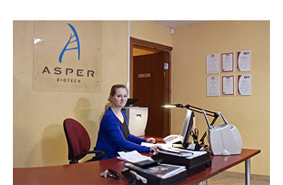Genetic testing at Asper Biogene
Genetic testing services offered by Asper Biogene comply with the highest level quality standards and are certified by Clinical Laboratory Improvement Amendments (CLIA) and ISO 15189:2012. We regularly participate in external quality assurance schemes to maintain the highest level of testing services.
Single mutation analysis
Single mutation analysis for any familial or known mutation.
Single gene sequencing
Sequencing of the entire coding region of any single gene.
Targeted regions sequencing
Targeted regions sequencing includes the analysis of selected hotspot regions in disease associated genes.
Deletion/duplication analysis
Deletion/duplication analysis for the genes listed in our test menu.
Our testing menu includes a wide variety of carefully constructed NGS panels. Essential medical specialities are covered by our clinically relevant, validated, and up-to-date gene panels. NGS panels include the sequencing of entire coding regions plus flanking intronic regions. Likely pathogenic and pathogenic variants are confirmed by Sanger sequencing.
In addition, CNV analysis based on sequencing coverage depth data is also available. Likely pathogenic and pathogenic findings are confirmed using another technology such as aCGH, qPCR, or MLPA when applicable.
We upgrade the existing gene panels continuously as well as create additional ones based on new scientific knowledge and customer requests.
Customized NGS panels
In addition to ready-to-use tests, we develop and implement custom-made tests and solutions to meet our customers’ specific needs.
Existing NGS panels are easily adjustable for your clinical practice and patients’ indications.
For customized NGS panels, fill in the Custom test order form or ask for more information on redesigning solutions for additional panels.
WES includes the sequencing of coding regions and their flanking intronic regions in approximately 20,000 genes of the human genome. The coding region represents 1–2% of the human genome but contains approximately 85% of the disease-causing mutations. Phenotype/diagnosis associated likely pathogenic and pathogenic variants are confirmed by Sanger sequencing.
CNV analysis based on sequencing coverage depth data is available as an expanded testing option. Likely pathogenic and pathogenic findings are confirmed using another technology such as aCGH, qPCR, or MLPA when applicable.
WES is an effective option to detect the rare causal variants of Mendelian disorders. Service can be useful for clinicians to diagnose affected patients with conditions that have eluded traditional diagnostic approaches.
WGS determines the complete DNA sequence of an individual’s genome, including chromosomal DNA and mitochondrial DNA.
WGS covers the sequencing of the entire coding and non-coding regions of the genome. WGS enables detection of non-coding sequence variants that could be informative in diagnosing genetically and phenotypically heterogeneous or undiagnosed diseases. WGS can reveal the full range of variations, including single nucleotide variations, copy number variations, changes in transposable elements, and structural variations.
Phenotype/diagnosis associated likely pathogenic and pathogenic variants are confirmed by Sanger sequencing.
Trio exome or genome sequencing of family members (usually affected child with parents) is highly recommended for faster and more precise identifying of disease-causing mutations and determining the inheritance pattern. In addition to the patient’s phenotype/disease associated variants, incidental findings are reported according to ACMG recommendations for reporting of incidental findings in clinical exome and genome sequencing.
Bioinformatic analysis and interpretation of customer’s genetic data
Asper Biogene’s qualified geneticists analyze and interpret your sequencing data, deletion/duplication analysis results etc.
Ask for a customized solution from our experienced team to facilitate your clinical practice.
Results report
Our results report contains detailed information on the detected variants, including bioinformatics analysis, biological interpretation, comprehensive clinical interpretation and recommendations for follow-up analyses. Rare and known pathogenic variants are assessed and classified according to the standards and guidelines of the American College of Medical Genetics and Genomics and the Association for Molecular Pathology. Confirmation of likely pathogenic or pathogenic variants is performed by Sanger sequencing.





